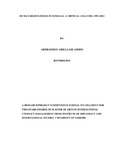| dc.description.abstract | The overthrow of President SiyadBarre in 1991 marked a turning point in Somalipolitics,
economy and society. After the ousting of Barre regime by the Rebel forces in 1991, turmoil,
factional fighting, and anarchy ensued in Somali. The Somali National Movement (SNM) gained
control of the north, while in the capital of Mogadishu and most of southern Somalia, the United
Somali Congress achieved control. Somalia had been without a stable central government since
Mohamed SiadBarre fled the country in 1991.Generally security situation in Somalia is
unpredictable and in particular the capital Mogadishu is marked by daily hand-grenade attacks
and roadside bombs directed at Ethiopian soldiers and the Somali government forces.
Accordingly, traditional or customary law is the most prevalent legal system in today's Somaliain
their role as enforcers of law and order within and between clans; traditional leaders have come
under sustained pressure from Somalia’s long-lasting environment of conflict, rapid
socioeconomic change and the absence of law and order. In the next chapter I will discuss the
human rights issues in Somalia from the periods 1991-2012.
The European colonization of Somalia and the Horn of Africa involved periods of warfare
between the colonialists and Darawish forces of Siyad Mohamed Abdulla Hassan and between
Britain and Italy during World War II.In this regard, colonialism is said to have had a
permanently damaging effect on the Somali people, Somalia’s socio-economic system and
attempts at post-independence reconstruction.
The study will see that if Somali state was heavily dependent on foreign aid. As this aid declined
in the late 1980s, what was the end result? Political and economic competition among the elite
was turned inwards over Somalia’s local resources. The study will find out that if the conflict in
Somalia from its onset was caused by clannism and nepotism and unequal distribution of the
natural resources whereby the country was divided between the northerners (marginalized) and
the southerners (elites) as some quarters had claimed in this study.War crimes were also
allegedly committed, and the study will expose if such crimes were committed against the people
of Somalia. | en |

